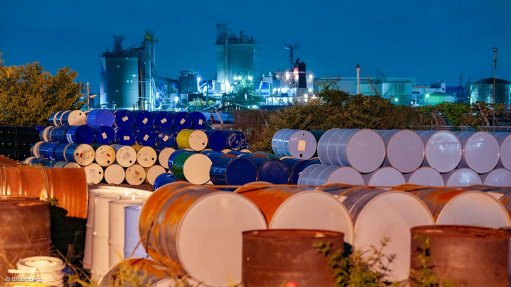AI for the Planet to put out calls for solutions to help world reduce GHG by 50% by 2030
Neutral global platform Artificial Intelligence (AI) for the Planet Alliance has launched a global call to identify and support promising innovations in climate AI, as well as a call for innovators in any sector to submit their AI tools and products that are ready to scale and that can help companies and countries mitigate climate change, alliance founder and co-chairperson Damien Gromier said this week.
This call for solutions, which closes on October 15, is aimed at helping the most promising AI innovations and solutions scale up, as well as to accelerate the adoption and use of AI tools and solutions to combat the impact of climate change.
The AI for the Planet Alliance will also connect the most promising submissions and projects with climate and AI experts and international investment funds.
The top ten solutions will also be invited to pitch at the AI for the Planet Alliance conference in March 2023, which will include participation by representatives from international organisations and agencies, including the United Nations and AI for the Planet Alliance community member organisations, Gromier pointed out in a July 7 media briefing.
The AI for the Planet Alliance and its efforts are aimed at trying to help companies and countries reduce their greenhouse-gas (GHG) emissions by 50% by 2030, he added.
"Except for 2021, global carbon emissions have continued to increase each year. The concentration of carbon dioxide (CO2) in the atmosphere is 421 parts per million (ppm) and the risk of exceeding the goal of limiting warming to 1.5 °C starts at 430 ppm," noted Boston Consulting Group (BCG) Climate & Sustainability Practice global leader Hubertus Meinecke.
To limit warming to 1.5 °C, as agreed at the Conference of the Parties in Paris in 2015, requires a reduction of about half of CO2 by 2030.
"This is a daunting task and governments must change regulations to align to new pledges made in 2021, and businesses need to innovate, change business models and use technology to achieve the 50% reduction by 2030," he said.
However, the call for AI climate solutions is not only about mitigation because, even if the world is able to halve GHG emissions by 2030, it will still face serious climate impacts.
"We are already too late and adaptation is important to mitigate negative impacts, such as from rising sea levels and extreme weather events," said Meinecke.
Additionally, many organisations feel the pressure of needing to announce targets to reduce their emissions and environmental impact, but few leaders are confident about their organisations' baseline emissions, particularly in terms of Scope 3 emissions in their supply chains, he points out.
"AI is an answer. Calculating baseline emissions is complicated owing to the need to understand all the emissions of suppliers and AI can aggregate the non-standardised data dispersed across many different systems and help to create transparency across value chains," said Meinecke.
BCG, in partnership with the AI for the Planet Alliance, published a report 'How AI Can Be a Powerful Tool in the Fight Against Climate Change' that found that 87% of more than 1 000 decision-makers in 14 developed and developing countries, including South Africa, said AI could be a helpful tool in the fight against climate change.
"However, only 43% of respondents can envision using AI for their climate efforts, which means less than half of those who identified AI as a potentially useful tool know what use cases they will address and how to put AI into place to fight climate change," he said.
There is widespread agreement that significant barriers to broad adoption remain in place, with 78% of respondents citing insufficient AI expertise as an obstacle to using AI in their climate change efforts, 77% citing limited availability of AI solutions as a roadblock and 67% point to a lack of confidence in AI-related data and analysis, said BCG Climate AI Adaptation and Resilience Business MD and partner Hamid Maher.
AI’s unique capacity to gather, complete and interpret large, complex datasets means it can help stakeholders take a more informed and data-driven approach to combating carbon emissions and addressing climate risks.
However, most existing AI-related climate solutions are scattered, tend to be difficult to access, and lack the resources to scale. These shortcomings need to change, he said.
"We need to act now. Executives believe AI can be a useful tool in the fight against climate change, but most do not know how to use it. This is why BCG helped to launch the AI for the Planet Alliance and put out a call for solutions to help them get exposure, scale up and also match the needs addressed by these solutions for private and public use cases," he said.
Further, the global leaders and decision-makers surveyed said AI can be used to achieve their goals in multiple ways, including mitigation, which is one of the most critical uses of AI for measurement, reduction and removal of emissions and GHG effects.
More than 60% of public- and private-sector leaders see the greatest business value for their organisations being in the reduction and measurement of emissions. According to BCG, use of AI can drive reductions of 5% to 10%, or 2.6 Gt to 5.3 Gt of CO2 emissions, if applied globally, Maher said.
Additionally, respondents said AI can be used for adaptation and resilience. Adapting to climate change is a critical undertaking for policy makers and the public, as it boosts resilience to the effects of both long-term climate trends and extreme weather events.
"AI is well suited to help project climate-related hazards, whether by improving long-term projections of localised events, such as sea-level rise or by upgrading early warning systems for extreme weather phenomena, such as hurricanes or droughts.”
Meanwhile, AI can also be used to support research and education efforts about climate change, help stakeholders understand the risks and implications involved and encourage them to share what they learn.
These efforts support and magnify ongoing work toward mitigation and adaptation and resilience, emphasised Maher.
"A multitude of critical uses for AI exist in the climate change arena, but any successful AI solution must be user-friendly and readily accessible. It must offer tangible benefits to the user and provide clear recommendations that are easy to act on.
AI solutions, therefore, need much more meaningful support, including access to capital investment, decision makers, and trained practitioners. The AI for the Planet Alliance aims to provide access to solutions and expertise to enable public and private users to measure their environmental impact, model different mitigation and reduction scenarios and implement the most impactful initiatives to reduce their emissions.
“AI has strong promise to help solve the climate crisis, but AI alone is not enough. It depends on the will of decision-makers to act and make necessary changes, and supported in part by AI and other emerging technologies,” said Gromier.
Comments
Press Office
Announcements
What's On
Subscribe to improve your user experience...
Option 1 (equivalent of R125 a month):
Receive a weekly copy of Creamer Media's Engineering News & Mining Weekly magazine
(print copy for those in South Africa and e-magazine for those outside of South Africa)
Receive daily email newsletters
Access to full search results
Access archive of magazine back copies
Access to Projects in Progress
Access to ONE Research Report of your choice in PDF format
Option 2 (equivalent of R375 a month):
All benefits from Option 1
PLUS
Access to Creamer Media's Research Channel Africa for ALL Research Reports, in PDF format, on various industrial and mining sectors
including Electricity; Water; Energy Transition; Hydrogen; Roads, Rail and Ports; Coal; Gold; Platinum; Battery Metals; etc.
Already a subscriber?
Forgotten your password?
Receive weekly copy of Creamer Media's Engineering News & Mining Weekly magazine (print copy for those in South Africa and e-magazine for those outside of South Africa)
➕
Recieve daily email newsletters
➕
Access to full search results
➕
Access archive of magazine back copies
➕
Access to Projects in Progress
➕
Access to ONE Research Report of your choice in PDF format
RESEARCH CHANNEL AFRICA
R4500 (equivalent of R375 a month)
SUBSCRIBEAll benefits from Option 1
➕
Access to Creamer Media's Research Channel Africa for ALL Research Reports on various industrial and mining sectors, in PDF format, including on:
Electricity
➕
Water
➕
Energy Transition
➕
Hydrogen
➕
Roads, Rail and Ports
➕
Coal
➕
Gold
➕
Platinum
➕
Battery Metals
➕
etc.
Receive all benefits from Option 1 or Option 2 delivered to numerous people at your company
➕
Multiple User names and Passwords for simultaneous log-ins
➕
Intranet integration access to all in your organisation


















